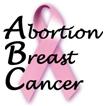Misleading Article Published
A new magazine for crisis pregnancy centers called, At the Center, which is published by Marketing Partners, Inc. and which claims to be a Christian-owned communications management company, has published a very misleading and inaccurate article about the abortion-breast cancer link. The article was "researched" by Dr. Dora Kingsley, D.P.A., who relied heavily on articles from Newsweek and U.S. News & World Report and the severely criticized 1997 Melbye study for her information. A simple search of Medline would have revealed to Dr. Kingsley that there are now 27 out of 33 worldwide studies which have implicated abortion as a risk factor for breast cancer. It is remarkable that she does not mention the 1994 study done by Dr. Janet Daling of the Fred Hutchinson Cancer Center in her article which reported an increased risk of 50% among women who had had an induced abortion. It is also extraordinary that she neglected to add that there are now 5 studies which show more than a twofold elevation in risk for breast cancer.
Dr. Kingsley is C.E.O. of Trenton West, a research firm in Sacramento, California which Marketing Partners claims has "collected more than 60,000 source documents and bibliographic abstracts concerning abortion and many issues related to pregnancy, crisis care, legal issues, and legislative actions." 1 Marketing Partners is offering Dr. Kingsley's "help" to crisis pregnancy centers who want their Frequently Asked Questions (FAQ) answered.
Our rebuttal to this article was sent to Marketing Partners, Inc., and it is shown below:
COALITION ON ABORTION/BREAST CANCER
An International Women’s Organization
www.abortionbreastcancer.com
June 5, 2000
Jerry Thacker
Publisher
Marketing Partners, Inc.
P.O. Box 100
Morgantown, PA 19543
Re: “A Link Between Abortion and Breast Cancer?” At the Center; Spring, 2000
Dear Mr. Thacker:
The Coalition on Abortion/Breast Cancer is a women’s organization whose mission is to educate the public about the abortion-breast cancer link and to save the lives of women. We read Dr. Dora Kingsley’s article, “A Link Between Abortion and Breast Cancer?” with great interest.
We are concerned, however, that Dr. Kingsley has relied upon the information provided by the National Cancer Institute on the abortion-breast cancer link because the NCI has publicly suffered a loss of its credibility on this issue. On July 20, 1998 during a Commerce Committee hearing on “The State of Cancer Research,” Congressman Tom Coburn, M.D., an obstetrician-gynecologist, accused the NCI of misleading the public and of “selectively releasing data” on the subject. The NCI’s web site at that time included, not only misleading information, but a statement which has been called “an outright lie.” It said, “The scientific rationale for an association between abortion and breast cancer is based on limited experimental data in rats and is not consistent with human data.”
A congressional investigation led by Congressman Tom Bliley ensued. In June of 1999 a debate on the abortion-breast cancer link took place on the floor of the House of Representatives during which Congressman Chris Smith called upon the “abortion establishment” to “stop the cover-up.” Late last summer, Congressman Dave Weldon, M.D. sent a letter to all of his colleagues and called abortion “a health care time-bomb.” Under this pressure, the NCI revised its web site, and the above statement was removed last year.
The NCI’s latest information, however, is conspicuous for what it still does not tell women. It does not reveal that there are 27 out of 33 worldwide studies going back to 1957 which have linked abortion with breast cancer and 17 of which are statistically significant. Fourteen studies are American and 13 of them have implicated abortion as a risk factor for breast cancer. Nor does the NCI identify the five studies which have shown more than a twofold increased risk of breast cancer.
While the 1997 Danish study, also known as the Melbye study, looks impressive because of its size and the use of public registries to identify women who have had abortions, it has been severely criticized for its misclassification and data adjustment errors. For instance, a much smaller group of younger women and girls who had had abortions (280,691) was compared to a larger number of older women who hadn’t had abortions (1,248,541). Obviously, older women are at greater risk for developing breast cancer than younger women.
It has been argued that the errors in the study likely masked a statistically significant risk increase. 2 Additionally, the Danish study reported that “[w]ith each one-week increase in the gestational age of the fetus . . . there was a 3 percent increase in the risk of breast cancer.”
It is interesting that the Melbye researchers corrected some of these errors in a 1999 study, but declined to admit that they were doing so and did not provide a reanalysis of their induced abortion data from the earlier study. Dr. Joel Brind, President of the Breast Cancer Prevention Institute, intends to do so this summer.
Last year an attorney, John Kindley, wrote an article for the Wisconsin Law Review and argued very effectively that there is now sufficient evidence of the abortion-breast cancer link to compel physicians to properly inform women of the increased risks of abortion. Physicians who fail in their duty to obtain informed consent from their patients are at very great risk for medical malpractice suits. Moreover, Kindley is currently pursuing a false advertising lawsuit against a clinic in Fargo, North Dakota which has been claiming in its pamphlets given to its patients that the available medical research does not implicate abortion as a risk factor for breast cancer.
Our organization will soon be asking the crisis pregnancy centers across the nation to help identify potential plaintiffs. For additional information, they may check our web site at www.abortionbreastcancer.com We respectfully request that your magazine print our letter in order that the CPC’s can be brought up-to-date on the abortion-breast cancer link
Sincerely,
Karen Malec
Coordinator


